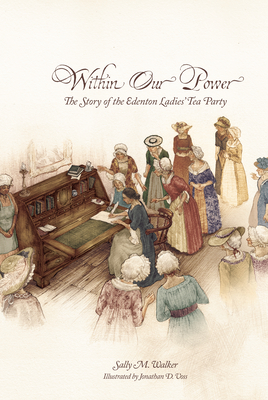
description
Great Britain's North American colonies were angry. They had been ordered to pay money--taxes--to the government. However, they had no governmental representatives in faraway England to say how they wanted their money spent. The colonists rallied around the cry "Taxation Without Representation." They boycotted tea, cloth, and other British products. Fearing punishment for protesting the unfair practice, some disguised themselves to avoid recognition, specifically when dumping tea in a harbor. Others wrote about it but hid their identity by using an alias.
A group of fifty-one women in Edenton, North Carolina, strongly opposed taxation without representation. At that time, women could not serve in the government, nor were they permitted to vote. But the Edenton ladies knew that their beliefs mattered. They decided they would make a difference. Like others, they would boycott British products. Unlike others, they shunned anonymity.
Using a "tea party" of a different sort, Edenton's courageous women powerfully expressed their belief in a very public way. One that spread their belief and commitment not only throughout the North American colonies, but also across the Atlantic Ocean. The Edenton ladies' courage still resonates today. They show us that people can join together and create a strong voice that stands firm against injustice.
A group of fifty-one women in Edenton, North Carolina, strongly opposed taxation without representation. At that time, women could not serve in the government, nor were they permitted to vote. But the Edenton ladies knew that their beliefs mattered. They decided they would make a difference. Like others, they would boycott British products. Unlike others, they shunned anonymity.
Using a "tea party" of a different sort, Edenton's courageous women powerfully expressed their belief in a very public way. One that spread their belief and commitment not only throughout the North American colonies, but also across the Atlantic Ocean. The Edenton ladies' courage still resonates today. They show us that people can join together and create a strong voice that stands firm against injustice.
member goods
No member items were found under this heading.
Return Policy
All sales are final
Shipping
No special shipping considerations available.
Shipping fees determined at checkout.







